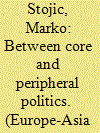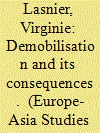| Srl | Item |
| 1 |
ID:
153968


|
|
|
|
|
| Summary/Abstract |
This article seeks to determine whether parties’ governmental/opposition and core/peripheral positions in the Serbian and Croatian party systems are related to their responses to European integration. In general, parties’ positions in the party system were not crucial driving forces behind their stances towards the EU. However, the experience of opposition significantly contributed to ideological transformation and the adoption of a Euro-enthusiastic agenda by strategically motivated, formerly Eurosceptic parties. Also, different types of party systems in Serbia and Croatia created different opportunities for parties to express Eurosceptic sentiments, with a fragmented and polarised system in Serbia being more conducive to the sharp contestation of EU issues.
|
|
|
|
|
|
|
|
|
|
|
|
|
|
|
|
| 2 |
ID:
153971


|
|
|
|
|
| Summary/Abstract |
The aftermath of the 2011–2012 Russian social movement Za chestnye vybory (For Fair Elections) challenges the common assumption that sees mass mobilisation as leading to positive outcomes for civil society. This article argues that the movement, by failing to institutionalise cooperative ties and secure popular support, had ambiguous outcomes for civil society. While repression surely played a role in this outcome, choices made by movement leaders during demobilisation should not be overlooked: one part of the movement became radicalised while another made a premature attempt to enter formal politics, thus hindering the movement’s later attempt to institutionalise.
|
|
|
|
|
|
|
|
|
|
|
|
|
|
|
|
| 3 |
ID:
153973


|
|
|
|
|
| Summary/Abstract |
This article addresses the ways in which the systemic transformation of the former Soviet republics has been reflected in urban development in two capital cities, Minsk (Belarus) and Astana (Kazakhstan). Changes taking place in these capitals have been analysed through the prism of an ideological recycling of the socialist legacy, a concept that permits exploration of which aspects of the socialist legacy have been jettisoned and which retained, in the process of formation of a capital. The article explores the nationalising strategies adopted by Belarus and Kazakhstan and reified by various practices, including those involving the recasting of cities. These strategies, however, are analysed not as inventions of post-Soviet regimes, but as forms of structural continuity.
|
|
|
|
|
|
|
|
|
|
|
|
|
|
|
|
| 4 |
ID:
153969


|
|
|
|
|
| Summary/Abstract |
Observing a case of transnational migration between Estonia and Finland, this article investigates how the experience of living in a Western democracy alters discourses of citizenship amongst people who have been socialised into the concept while living in a post-communist country. Through a discursive approach, the article demonstrates that, notwithstanding 25 years of democratic transformation, the norms of post-communist citizenship remain different from the Western liberal and republican norms. However, European Union citizenship plays an important transforming role on the discursive level.
|
|
|
|
|
|
|
|
|
|
|
|
|
|
|
|
| 5 |
ID:
153962


|
|
|
|
|
| Summary/Abstract |
The nomenklatura system granted Poland’s communist party the opportunity to control key recruitment processes. This article analyses the rules whereby party authorities, between 1956 and 1970, introduced and implemented the nomenklatura system locally. The main goal is to examine how the system functioned, focusing on the strategy pursued by local party structures. The article shows that the agents manipulated the system and modified its rules. As a result, the nomenklatura system became one of the key forces behind the growing importance of informal political practices in Poland’s socialist-state system.
|
|
|
|
|
|
|
|
|
|
|
|
|
|
|
|
| 6 |
ID:
153974


|
|
|
|
|
| Summary/Abstract |
This article examines a series of political changes that recently affected the levels of religiosity in Azerbaijan. Since 2009 the Azerbaijani leadership has adopted a set of laws and policy regulations designed to restrain Islamism and Islamic activism. In spite of heavy-handed state control and legal restrictions, there has been a visible increase of religiosity within Azerbaijani society, particularly amongst religious organisations and parties. The article aims to decode the underlying reasons behind the persistent upsurge of religiosity in Azerbaijan and further our understanding of the social–political implications of this trend. The article also argues that, since restrictions were imposed on religious expression in 2009, the revival of Islam in Azerbaijan has become much more visible while serving as an alternative avenue for the emergence of social movements within the country.
|
|
|
|
|
|
|
|
|
|
|
|
|
|
|
|